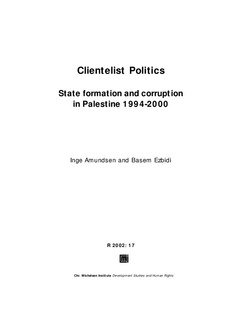Clientelist Politics. State formation and corruption in Palestine 1994-2000
Research report
Permanent lenke
http://hdl.handle.net/11250/2435883Utgivelsesdato
2002Metadata
Vis full innførselSamlinger
- Bora-import [434]
Sammendrag
The state formation process in Palestine started after the Oslo agreements between Israel and Palestine in 1994, which established a Palestinian quasi-state. The process came, however, to an almost complete halt with the onset of the second intifada in late 2000 and definitely with the Israeli reoccupation of the West bank and Gaza in 2002. At the time of writing, Palestine is divided into eight zones, with 120 checkpoints and 220 enclaves, a wall is being built, the economy is in ruins and the Palestinian administration hardly operates.This report argues that despite the authoritarian traits and strengths of the Palestinian National Authority, which could have led to a distinct developmentalist state, the same traits pushed the PNA into corrupt, clientelist practices and fragmentation.The obstacles were almost insurmountable. Palestine had an unsettled international status and an open-ended conflict with Israel over territories and resources, and an enclave economy. Some signs were nevertheless very positive. Initially there was a large degree of national pride and willingness to make huge sacrifices for the purpose of nation reconstruction, a large degree of popular support for the PNA, quite a degree of unity and autonomy within the state leadership (based as it was on the PLO), and a display of government capacities to implement some of the basic policies and reforms necessary for development.However, the clientelist and corrupt practices, together with a weak legal foundation and internal resistance to democratisation, hampered the process of democratisation and participation, restricted the institutionalisation of checks and balances, and opened up for massive criticism and weakened legitimacy of the regime. Thus, PNA failed in fulfilling the pressing need for democratic reforms, including room for participation, institutionalisation and transparency, in order for the Palestinian Authority to gain more legitimacy internally and externally.
Utgiver
Chr. Michelsen InstituteSerie
Research reportR 2002: 17
